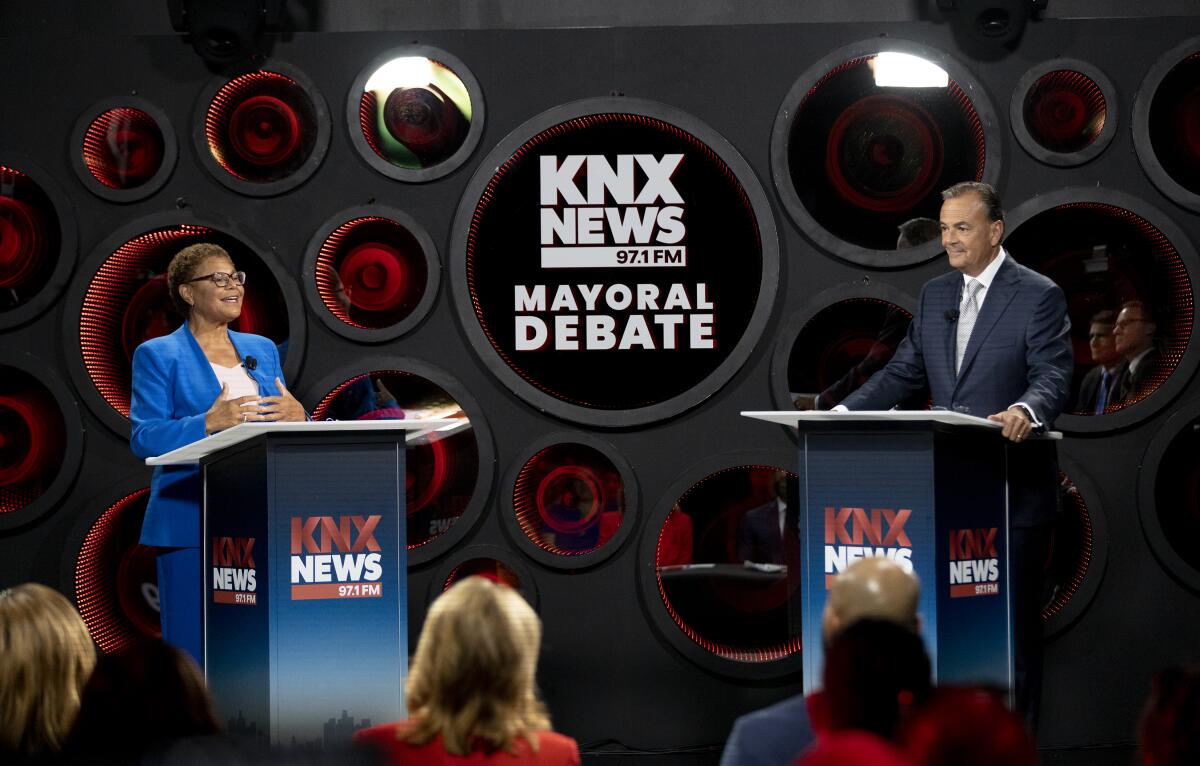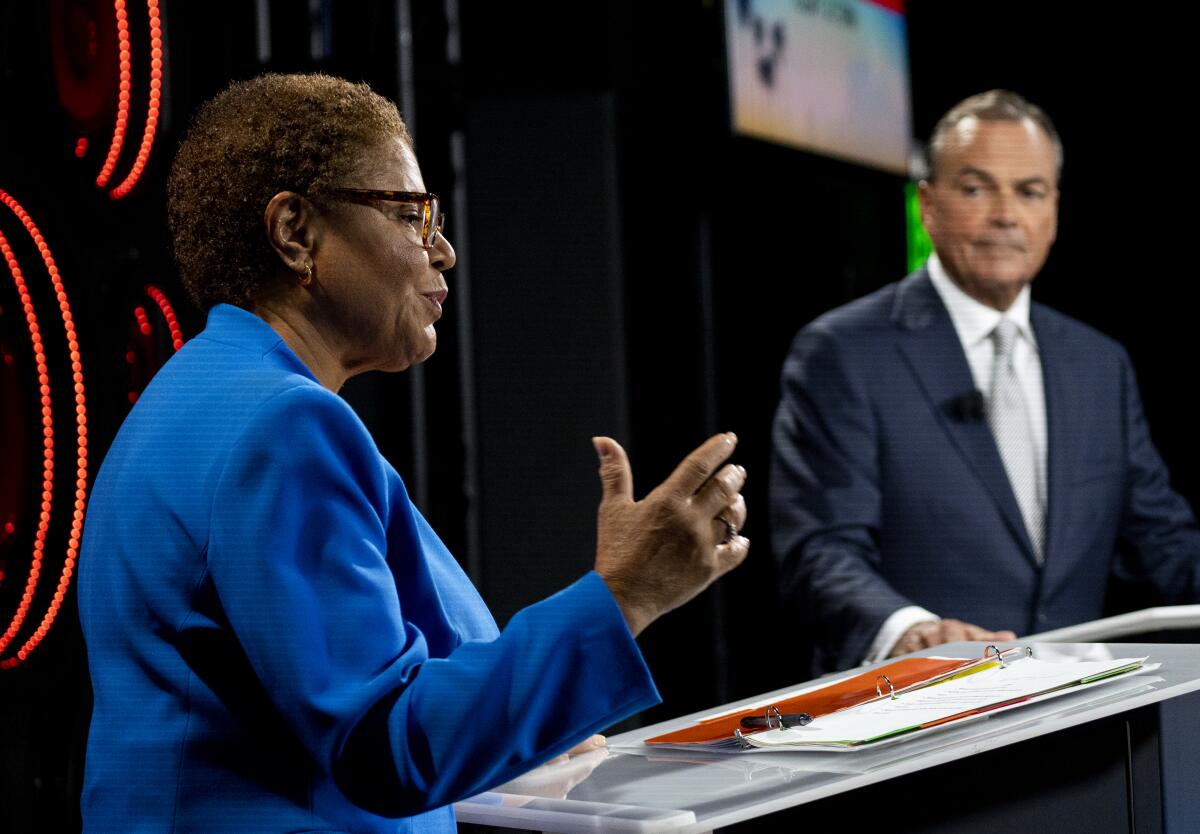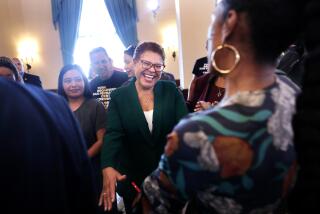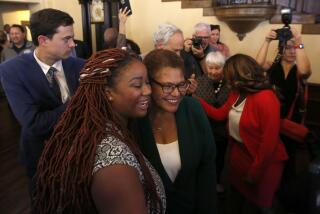Bass, Caruso spar over USC, Scientology, policing and housing in L.A. mayoral debate

- Share via
Rep. Karen Bass and Rick Caruso both found themselves on the defensive Thursday evening as a quintet of moderators pressed them on an array of pain points during an hourlong live debate.
If either candidate had a wish list for uncomfortable topics they hoped their opponent might be pushed on, they probably saw it fulfilled — albeit while parrying their own laundry list of attack-line questions.
The rhetorical daggers flew fast and furious between the candidates, with Bass attempting to portray the real estate developer as a shape-shifting opportunist whom voters can’t fully trust. Caruso, in turn, aimed to characterize the congresswoman as lacking judgment and having little to show for her time in Washington, D.C.
Rick Caruso and Karen Bass are running for Los Angeles mayor. Here is your guide to the race.
The debate — broadcast live on the radio from KNX News’ Miracle Mile studio — comes at a pivotal moment in the election cycle. The Los Angeles County registrar-recorder/county clerk began mailing ballots to voters Thursday morning, and Nov. 8 is in less than five weeks.
USC, the candidates’ shared alma mater, has become something of a dual-purpose battering ram in the mayoral race and both candidates fended off questions about their relationships to scandals at the university.
KNX News digital managing editor Seth Lemon asked Bass whether she regretted accepting a $95,000 scholarship to get a master’s degree in social work from Marilyn Flynn, the dean of the school, who last month pleaded guilty in a separate corruption case.
The congresswoman said she didn’t regret it and reiterated points she has made before about how the social work degree helped her “protect the nation’s most vulnerable children.”
Lemon then asked Caruso why he backtracked on a pledge to release an internal report about an investigation of a USC gynecologist accused of sexual misconduct.
“The reason we didn’t release the report: we talked to experts, many of them, that said releasing any information is just going to cause more horrific pain to those that have been terribly, terribly wounded,” Caruso said.
Bass volleyed back at Caruso, asking, “What about the victims? If that’s what they wanted, they should have had it,” Bass said.
Spectrum News anchor Giselle Fernandez pushed Caruso on his previous position on abortion rights, citing a 2007 Los Angeles Magazine story that paraphrased his views on the subject to say he “opposes abortion in most cases but would support some stem cell research.”
Caruso appeared to contend that the article was inaccurate, saying he was speaking about stem cell research and citing another quote from the article in which he spoke about the government staying out of people’s private lives.
“Los Angeles Magazine has now and had then a very rigorous fact-checking process,” Ed Leibowitz, the article’s author, told The Times on Thursday night. “Everything in the article was fact-checked, including that.”
Leibowitz also said he spoke to Caruso after the article ran and Caruso never raised any issue with the categorization, nor had Caruso or anyone in his organization contested it with Leibowitz in the 15 years since publication.
KNX anchor Charles Feldman brought up Bass’ 2010 speech praising Scientology — a clip of which Caruso has been running as a TV ad — and asked how she had been unaware of controversy about the church.
Bass said that, in hindsight, she wouldn’t have gone to the event.
“I certainly knew of some of Scientology’s abuses. I didn’t know the depth of them. I learned it later,” she said.
Caruso countered that Bass’ decision to give the Scientology speech reflected poorly on her integrity as a leader.
“It’s about credibility. It’s about character. It’s about judgment,” Caruso said.
Shar Jossell of Channel Q, an LGBTQ-themed network based in L.A., asked both candidates pointed questions about why they hadn’t done more — Caruso as a builder and Bass as a state and federal lawmaker — to bring housing to the city.
Jossell said Caruso had built only one apartment complex and that the rent for a one-bedroom unit, $6,300, was more than double the median one-bedroom rent in the city. Caruso said his business had been focused on building retail centers, but he would now turn his full attention to housing.
He turned the question back on Bass, asking why she had not passed any legislation to bring more housing to L.A. She countered: “You are a builder, but you still haven’t built one unit of affordable housing.”
On homelessness, Bass said that the city has to “get people off the streets immediately” but warned that if the underlying roots of the problem aren’t addressed, people will slip back into homelessness. She also drew attention to Caruso’s plans to build 30,000 interim housing units, accusing him of wanting to “essentially round up people and warehouse them in shelters.”
Pressed by moderators, Bass said the federal government must relax some of the requirements around housing to allow more people to be sheltered. The Times recently reported that local housing agencies returned $150 million to the federal government because it couldn’t be spent fast enough.
Bass’ remarks prompted Caruso to accuse her of not doing more on homelessness while in Congress.
“She said the federal government should really reduce all the regulations. You’re a powerful woman in Congress. Why didn’t you do that?” Caruso said, speaking to Bass directly.

When asked, neither Bass nor Caruso would rate the performance of Police Chief Michel Moore. Instead, they quarreled over the best strategy for expanding the size of the LAPD, which has lost about 8% of its officers since the onset of COVID-19.
Bass said she would work to move officers out of desk jobs and into patrols. She hit Caruso over his promise to expand the department to 11,000 officers.
“My opponent says he wants to hire 1,500 police officers when he knows that the [police] academy can’t even fill a class now,” she said.
Caruso pushed back, saying it would not be possible to move 300 officers out from behind desks and onto the street, saying that 80% or more of desk officers “are behind the desk because they’re injured, so that can’t happen” — a claim Bass disputed.
A particularly contentious moment came after Caruso touted his endorsement from Avance Democratic Club, a progressive group focused on building Latino political power. Bass then suggested he bought the support.
“How much did you pay for it?” Bass said, prompting Caruso to reply that she had insulted the group.
Nilza Serrano, president of Avance, gasped when The Times called and repeated what Bass had said at the debate.
“That is unfortunate that she would make such a comment,” Serrano said. Caruso made efforts to contact members ahead of their endorsement, but Bass “didn’t activate her base within our organization,” Serrano said.
“That’s a clear reflection of her taking Latinos for granted. You really have to work your base to get us to show up. You can’t just take us for granted,” Serrano said. She said that about 85% of the members backed Caruso at their endorsement meeting last month.
Get the lowdown on L.A. politics
Sign up for our L.A. City Hall newsletter to get weekly insights, scoops and analysis.
You may occasionally receive promotional content from the Los Angeles Times.
Asked if Caruso had given any money to her club, Serrano said that Avance held an event Sept. 22 to honor Mark Gonzalez, chair of the Los Angeles County Democratic Party and Lorena Gonzalez, executive secretary-treasurer of the California Labor Federation.
She said she asked several political candidates, including Caruso and Bass, as well as unions, to sponsor the event. Serrano initially said Caruso gave $2,500, then corrected the number to $5,000 after checking with the group’s treasurer — an amount that matches campaign financial disclosure records. Bass didn’t provide any sponsorship money.
“She’s punching down,” Serrano said of Bass’ comments about Caruso buying the club’s support. “We’re just a little club.”
When asked for clarification about Bass’ accusation, campaign spokesperson Sarah Leonard Sheahan said: “Her statement is a reference to his campaign, which is based on money.”
Times staff writers Benjamin Oreskes and Libor Jany contributed to this report.
More to Read
Sign up for Essential California
The most important California stories and recommendations in your inbox every morning.
You may occasionally receive promotional content from the Los Angeles Times.















